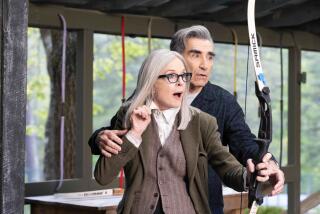MOVIE REVIEW : Keaton’s Disadvantage in Being ‘One Good Cop’
- Share via
Because the level of police drama on television is unusually high, movies about police are often at a disadvantage. Compared to TV, a passable police film may come across as sub-par.
Heywood Gould, the writer-director of the new Michael Keaton film “One Good Cop,” understands that you have to come up with something out of the ordinary to compete. But out of the ordinary isn’t the same thing as good. This police thriller (citywide) looks to be a cross-fertilization of “Hill Street Blues” and “Kindergarten Cop” and Fannie Hurst soapers and “Kramer vs. Kramer.” In its own subtly coercive way, it practically hammerlocks you into an emotional response.
Keaton plays Artie Lewis, a New York police detective whose widowed partner of eight years (Anthony LaPaglia) is blown away in a shootout, leaving Artie legal guardian to his three cherubic daughters. Since Artie and his wife Rita (Rene Russo) don’t make enough to persuade the adoption agencies they are fit providers, Artie, who has been tailing the scurvy drug lord (Tony Plana) responsible for his partner’s death, descends into temptation to come up with the dough.
The point of this film seems to be that cops have feelings too. Artie is handed the three girls in order to demonstrate he’s a closet softie. This may be a reasonable ploy for an Arnold Schwarzenegger, but Michael Keaton doesn’t need to be tenderized in this way. He’s far too bristling and acute and concentrated an actor; he resists the gummy packaging in this film by skating right across the goo.
Keaton is not the sort of actor who leans on an audience for sympathy--he’s scrupulous about being true to his own ornery instincts--and so he helps keep “One Good Cop” reasonably honest. But he does so at the expense of his wildest and most expansive gifts. The sodden “real people” quality of the script embalms him in decency, and it does justice neither to Keaton’s range nor to Artie’s character.
The realism of this film (rated R for violence, language and drug content) is a kind of fraud. We’re supposed to be seeing how the ultra-violence of police work clashes with the ordinariness of a cop’s domestic life. And yet the many drug-bust shoot-’em-ups that we witness seem like so much spicing in the melodrama. Artie rebounds from them with amazing alacrity; he cuddles with his wife and surrogate daughters within hours of the recurring mayhem.
It’s not that this sort of thing is implausible; it’s just that we need to see more of how Artie uses his home life as a way station between horrors. Heywood Gould is indulging in a white knight fantasy in “One Good Cop.” (Imagine, for example, how different the film would be if the three orphans were all boys.) Even though Artie’s wife is an obviously intelligent career woman, we never get a sense of what her life must be like constantly living on the edge. She’s the sympathetic nurturer of the piece. The film’s focus is all on Artie as protector.
The impulse behind “One Good Cop” is not disgraceful: It wants to mine the emotional core of policemen’s lives. But the new sentimentality that this film represents doesn’t feel any more genuine than the old hard-boiled impersonality. Alternately slam-bang and gooey, it straddles two sets of cliches.
‘One Good Cop’
Michael Keaton: Artie Lewis
Rene Russo: Rita Lewis
Kevin Conway; Lt. Danny Quinn
Rachel Ticotin: Grace
A Hollywood Pictures presentation in association with Silver Screen Partners IV, released by Hollywood Pictures. Director Heywood Gould. Producer Laurence Mark. Executive producer Harry Colomby. Screenplay Gould. Cinematographer Ralf Bode. Editor Richard Marks. Costumes Betsy Heiman. Music David Foster & William Ross. Production design Sandy Veneziano. Art director Daniel E. Maltese. Set decorator John Anderson. Running time: 1 hour, 54 minutes.
MPAA-rated R (violence, language & drug content).
More to Read
The complete guide to home viewing
Get Screen Gab for everything about the TV shows and streaming movies everyone’s talking about.
You may occasionally receive promotional content from the Los Angeles Times.






